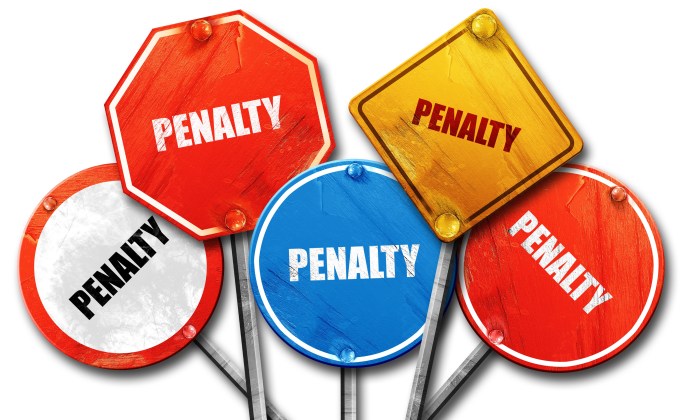As a seller/server you are subject to fines and penalties – As a seller or server, you are subject to fines and penalties for non-compliance with regulations and industry standards. Understanding the legal framework, potential consequences, and best practices for avoiding these penalties is crucial for protecting yourself and your business.
This comprehensive guide provides an overview of the legal framework surrounding fines and penalties, discusses the varying severity of penalties based on the nature of the violation, and elaborates on the potential financial impact, reputational damage, and loss of credibility that can result from non-compliance.
Understanding Fines and Penalties

Sellers and servers are subject to a complex legal framework that governs their conduct. Non-compliance with these regulations can result in significant fines and penalties.
Specific violations that may trigger penalties include:
- Selling or serving alcohol to minors
- Over-serving alcohol to patrons
- Failing to maintain a clean and sanitary establishment
- Violating fire safety codes
The severity of penalties varies depending on the nature of the violation. Minor infractions may result in fines, while more serious violations can lead to license suspension or revocation.
Consequences of Non-Compliance, As a seller/server you are subject to fines and penalties
Fines and penalties can have a significant financial impact on businesses. In addition to the direct cost of the penalty, businesses may also experience lost revenue due to license suspension or revocation.
Non-compliance can also damage a business’s reputation and credibility. Customers are less likely to patronize establishments that have a history of violating regulations.
Fines and penalties can also affect the overall profitability of a business. Businesses that are forced to pay large fines may have less money available to invest in other areas, such as staff training or equipment upgrades.
Methods for Avoiding Fines and Penalties
There are a number of steps that sellers and servers can take to avoid fines and penalties:
- Adhere to all applicable regulations and industry standards.
- Create and implement an effective compliance program.
- Provide ongoing training and education for staff.
Managing Compliance in Practice
To ensure compliance, businesses should develop a detailed plan that includes the following steps:
- Identify all applicable regulations and industry standards.
- Develop policies and procedures to ensure compliance.
- Train staff on the policies and procedures.
- Monitor compliance and take corrective action as needed.
Businesses can also use technology to assist in compliance. Software and tools are available to help businesses track compliance, identify potential risks, and train staff.
Role of Technology in Compliance
Technology can play a valuable role in helping sellers and servers comply with regulations. Software and tools are available to help businesses:
- Track compliance
- Identify potential risks
- Train staff
For example, businesses can use software to track alcohol sales and ensure that they are not selling or serving alcohol to minors. Businesses can also use software to train staff on the latest regulations and best practices.
Questions and Answers: As A Seller/server You Are Subject To Fines And Penalties
What are the most common violations that result in fines and penalties for sellers and servers?
Some common violations include failing to comply with food safety regulations, violating alcohol serving laws, and engaging in unfair or deceptive business practices.
How can I avoid fines and penalties as a seller or server?
By adhering to regulations, implementing effective compliance programs, and undergoing ongoing training and education.
What are the potential consequences of non-compliance for sellers and servers?
Non-compliance can result in financial penalties, reputational damage, loss of credibility, and even legal liability.

